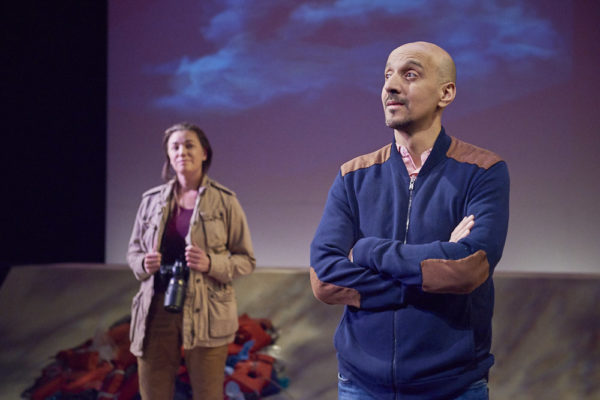By Jacob Forbes, Staff Writer
Portland Stage is premiering a topical work this fall with Refuge Malja. The play was written by Bess Welden, a Maine-based playwright who collaborated with Ali Al-Mshakheel in translating portions of the play into Arabic. It centers around Jamie, played by Brooke Parks, a Jewish-American photojournalist covering the still-ongoing Syrian Refugee Crisis, but on the Greek coast in 2015 when international attention was being given to the refugees in their plights to find new homes in Germany and other European countries.
Welden has tried with Refuge Malja to triangulate and dramatize a certain connection she made in 2015 while watching the migration crises on television, which she describes in the program notes. According to which, she had a relative who was a photojournalist in Greece at that time who had taken photos of the refugees’ shoes that had been discarded on the Greek beaches. Welden realized that each of those shoes “represents an individual human being with a story—and a lot of the shoes had obviously belonged to kids.” She also realized a certain “circularity” with Syrian refugees fleeing to Germany when there had been thousands of Jews that were fleeing from Germany less than 100 years ago to escape Nazi persecution and murder.
Unfortunately, all of these earnest connections Welden made as a television spectator and as a world citizen tuned into the horrible pathos of lone shoes found like orphans on Europe’s beaches, fail to mature into any type of theatrical product. Instead, the play takes the majority of its singular act focusing on Jamie and her distraught feelings.
The four other characters in the play, a brilliant Arabic journalist and former love interest of Jamie named Ibrahim, played by Amro Salama, a refugee boy that Jamie met on a Greek beach while taking photos named Waleed, played by Hussein Al-Mshakheel, this performance, the two mothers of Jamie and Ibrahim played by the singular Shauna Bloom and Jamie’s imaginary friend the Wolf, all seem subsidiary to the major drama going on inside Jamie’s heart. The origins of her inner drama are pointed out but remain vague. The viewer understands she has conflicts with herself, her mother and her former lover, but the development needed to make any of this engaging remains missing. Instead Jamie has an imaginary Wolf that speaks to her, haunts her, and eventually points her in the direction of her Jewish-American roots and the story of her grandfather’s attempt to flee Germany on a boat.
The story invites a thorough examination of the kind of violence that forces people to flee from their homelands. Unfortunately, one act is too short for even a satisfying synopsis, or some emotional depth. A historically-based drama needs to be able to convey the history that is propelling it, in some form however suggestive, but Jamie crowds the stage, dominates the dialogue, and turns the brutal existence of an orphaned boy on the Greek coast into a problem about her, about her past relationship and about her Grandfather who she has never met. Making connections between personal histories is certainly a foundation for understanding and for communication, but these triangulations between people and pain never move past their infant stages of recognition in Refuge Malja. They are not developed into something resembling a wholistic statement, just separate snapshots of pain that have been bound together in a single volume.
There are good moments in the play, but they are limited. The bilingual structure of the play underscores its major theme of communication between different cultures and different periods in history. Jamie and Waleed teach each other words in their respective languages using a point-and-shoot camera, Ibrahim reads his Arabic poems to Jamie and then translates them, and Jamie communicates with her past with the help of her old friend Wolf. Despite being Jamie-centric, the play is effective in bringing the fresh sound Arabic to a stage in Maine and skillfully placing it throughout the dialogue to make anyone more curious about the language and culture it comes from.
It is a disappointment to see the refugee crisis treated in an undeveloped way. Perhaps this crisis, especially as Americans understand it from the television and internet, is just too broad and far reaching to be rendered satisfactorily, in 2015, from our safe little living rooms. The conglomerate pain of these current millions of refugees really cannot be summed up with an image of a shoe, or by connecting them to European Jews in years past. These are steps in the right direction in the process of understanding, but they are ultimately beginnings.

